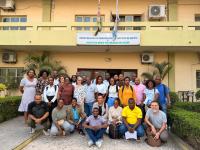ISAGS promotes conference to debate intellectual property and access to health in South America

How can protection to intellectual property limit the right to health? Which factors have hindered the access to health in South America? How can be we bring balance to the dilemma of promoting health technological innovation whilst guaranteeing access for the population?
In order to discuss these issues, which are in the agenda of the World Health Organization (WHO), the World Trade Organization (WTO) and the World Intellectual Property Organization (WIPO), the South American Institute of Government in Health (ISAGS) invited the political scientist, former WHO consultant and professor at the George Washington University (USA) Susan K. Sell for a special conference that will be held in Buenos Aires on December 3rd at 10 am (GMT -3).
The conference on “The Crisis in Health Innovation” will be broadcasted online in English through the link innovacion.isags.unasur.org. It will count with simultaneous translation into Spanish and Portuguese. Those who are interested in participating on the debate can send questions and comments to our email (comunicacao@isags-unasur.org), through Twitter (@isagsunasur) or Facebook (/isags.unasursalud).
“Addressing intellectual property is essential; more so in a moment when access and universal coverage are at the core of discussions proposed by health multilateral organizations. ISAGS has a fundamental role in fostering and supporting South American countries, as well as in bringing the values of UNASUR to these organizations”, highlighted ISAGS Executive Director José Gomes Temporão.
Intellectual Property vs. Access to Health
The debate on intellectual property and access to health has been going on for 20 years, since the Agreement on Trade-Related Aspects of Intellectual Property Rights (TRIPS) was subscribed in 1994. In the health sector, the adoption of TRIPS was particularly unfavourable for developing countries, which launched an international movement to defend sovereignty in public health vis-à-vis the commercial interests of pharmaceutical companies. The result was the break of antiretroviral drugs patents that, according to WHO, reduced the cost of AIDS treatments in the developing countries from US$ 15,000 to US$ 64 per person.
In September this year another controversy was stirred involving Sofosbuvir, a drug used in the treatment of Hepatitis C for the cost of US$ 84,000 per patient. The company that owns the drug’s patents announced a licence that allows the production of the generic version by seven Indian laboratories. However, this version will only be traded to countries chosen by the company. Seven of the 12 South American countries, as well as other middle-income countries in Latin America, are out of this list, which forces them to negotiate prices of the original drug directly with the lab.
This example illustrates Susan Sell’s opinion that asymmetric power relations are still shaping the intellectual property policies in the international arena. According to the researcher, this reality diminishes the room for manoeuvre within poorer and weaker countries in elaborating regulatory approaches that better suit their necessities and development levels.
“The current levels of protection to intellectual property are a problem to public health. Several international negotiations in progress right now, like the Transpacific Partnership and the Transatlantic Trade and Investment Partnership, are marked by the North American effort to dramatically increase the protection of intellectual property and control competition among generic drugs. This is detrimental to the populations that need these drugs,” she affirms.
Beyond the conference
Susan Sell’s lecture opens the Seminar “Public Health, Innovation and Intellectual Property: Perspectives for UNASUR”, aimed at promoting the debate on the issue and considering the consequences for the 12 South American countries’ public health. The event is promoted by ISAGS and will be held from December 3rd to 5th in Buenos Aires, Argentina.
Susan Sell has three published books and tens of articles about the issue. She has worked as consultant to the UN Conference on Science and Technology for Development (UNCSTD), to the Ford Foundation and the Open Society Institute. She is also part of the council of IP Watch, an independent organization that disseminates news and reports on the concepts and implementation of international intellectual property policies.



